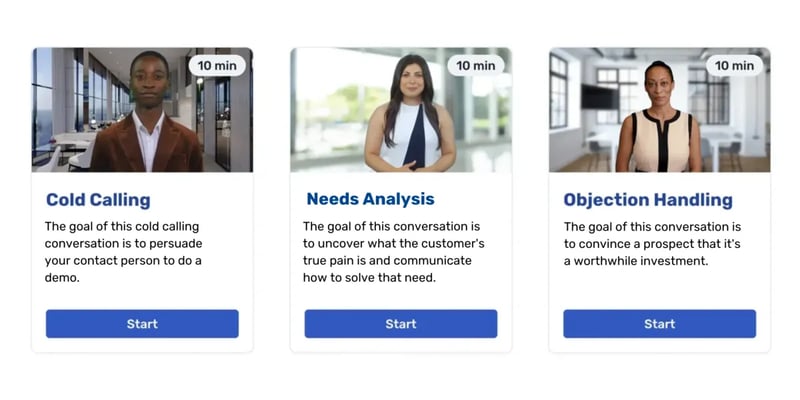Closing a sales deal begins with uncovering the true needs or pains of the customer and their expectations.
That is why ongoing growth and skill improvement, as well as addressing knowledge and skills gaps, become pivotal for sales reps in order to tap into ever-evolving customer needs, offer solutions, and deliver growth.
How can organizations establish an effective training program that not only engages but actually changes employee behavior? What are the training methods that will move employee performance and help sales teams uncover customers' true needs?
That is exactly why organizations globally are shifting their focus to their learning and development (L&D) investments, including customer needs analysis training. And today, with the rapid deployment of technology and AI tools, companies can harness the benefits of such training platforms powered by AI and confidently build the sales capabilities within their teams that will deliver growth to the organization and keep up with evolving needs.
What's in this post:
What is a customer needs analysis training program?
“The experience matters at every moment in the customer journey, and customers will judge any impediment along the way. It’s crucial to consider the experience from the customer’s perspective to understand their needs.”
- Harry Wray, Customer Success Executive at Zendesk
Customer needs definition
Understanding customer needs is the linchpin for sales reps to lead successful sales conversations and satisfy customers' needs. At the end of the day, how well a sales representative can explore the prospect's mind and uncover their needs and pain points will determine how well they can structure the conversation to lead to desirable outcomes, or, in other words, sell them value.
Examples of customer needs
In the dynamic landscape of modern business we are witnessing today, a company may seek innovative solutions or alternatives to position itself at the forefront of innovation. This may help them gain a competitive advantage and will be interested in sales reps that can convey new technologies or software.
An example of a customer need within the realm of B2C business may be personalization. In fact, already since the pandemic, 71% of consumers expect companies to deliver personalized services. When the sales team or reps can clearly identify what consumers are looking for and desire, they will be able to match their needs and provide satisfactory results.
What are the different types of customer needs?
According to Indeed, customer needs can vary between the following points and be split between product and service needs.
| Examples of product needs: | Examples of service needs: |
| Price | Empathy |
| Quality | Transparency |
| Convenience | Control |
| Functionality | Fairness |
| Experience | Options |
| Design | Accessibility |
| Reliability | Information |
Why is customer service needs analysis training important for sales teams?
We all know it well and clearly: Buyers want value.
But more importantly, they want sales reps and companies to understand their specific needs.
That's why when sales training programs encompass customer needs analysis training, sales reps learn to take their conversations from zero to hero, improve performance, and reach desired outcomes.
When they don't have these valuable insights and can't identify customer needs, sales conversations are
Once upon a time, customers relied heavily on salespeople to guide them to what they wanted. Shoppers knew what they wanted, and once this information was conveyed to the salesperson, they could then find the solution.
Today, shopping isn't the same. And shoppers aren't the same - consumers today are bombarded with loads of information and options, and no longer rely on sales reps to have the one product or service answer. On top of that, with the abundance of information that consumers have at their fingertips, shoppers don't need sales reps like they did in the past.
In fact, within the realm of B2B business, 77% of executive buyers claim salespeople don't understand their company's issues, or how they can help.
The bottom line is, that in order for sales reps to truly master the art of understanding customer needs, customer needs analysis training becomes evermore crucial.
How can you improve customer needs analysis training?
The world’s leading enterprises equip their sales teams to continually train and sharpen their skills. To do this, sales managers and L&D managers are harnessing the power of artificial intelligence (AI) to gain insight into their talent, identify any performance gap, and ultimately take their training programs to the next level and see real behavioral changes.
With AI-powered training platforms, sales reps can learn in-depth about analyzing customer needs via interactive video simulations that provide realistic scenarios, such as customer needs analysis, and practice in a virtual setting before interacting with real customers.
This way, reps can train on-demand, enabling access to new learning paths.

So how is AI-powered training being used for upskilling different employees in other areas?
AI for sales training programs
Facing real-world sales challenges, including uncovering customer's real needs and leading successful conversations, requires not only knowing what to do but also the ability to put knowledge into action. Therefore, when sales teams train using tailored video simulations built to reflect relevant, real-world situations, they are able to train and perfect those difficult situations.
Unlike other e-learning platforms, which also allow sales reps to train remotely but often lack engagement factors, one of the biggest reasons why organizations, from logistics to healthcare, are training their talent with AI-powered training platforms, is due to their high engagement.
With AI-powered platforms, the trainee cannot simply pre-select from possible answers, which you often find in traditional situational judgment tests (SJTs), but instead, must speak freely. This way, the learner actively retrieves knowledge and, like in real life, reacts immediately, i.e. when delivering bad news or handling difficult customer conversations in sales. Learning effectiveness is increased by mimicking a natural learning style, which matches how learning has to be applied later on. Furthermore, once the AI modules are completed, trainees receive on-demand, immediate tailored feedback from the AI platform. This analysis process essentially creates an environment where trainees get a strong sense of presence and immersion, minus the judgment and the external influences.
AI customer-service training programs
Exceptional customer support and reactive service are the cornerstones of thriving organizations, paving the way for customer loyalty, word-of-mouth referrals, and sustainable growth. Yet with escalating customer expectations, it has never been more challenging for companies to make every interaction an opportunity to foster loyalty.
With Al-powered training, customer service representatives get the opportunity to master the art of reactive support even before talking to real customers. Through interactive video simulations, tailored scenarios, and real-time feedback, AI-powered training enables customer service reps to create an unforgettable customer experience and drive business success.
Why is effective training so vital for customer service reps?
-
It ensures customer service teams receive the preparation to react swiftly and deliver excellence at every customer touchpoint.
-
It allows them to practice building strong customer loyalty and never risk losing customers for poor service.
-
When training with AI, customer service reps will receive instant, personalized feedback on their performance.
-
On-demand access to training with AI means the trainees have access whenever and wherever needed.
AI leadership training programs
As organizational change becomes a constant, the ability of an entire organization, to navigate these shifting tides rests heavily on the shoulders of its leaders, and the benefits of AI-powered training have been felt in the realm of leadership training as well.
For instance, when training with role-play scenarios and training materials that allow leaders to reflect on themselves and ultimately develop enhanced self-awareness, organizations can:
-
Develop behaviors that help them influence outcomes and inspire others.
-
Use Al metrics to measure exact ROl and ensure every cent goes towards developing agile leaders.
-
Make sure leaders are provided with self-reflection opportunities and see themselves through the eyes of their team.
-
Offer a psychologically safe space where leaders receive honest, unbiased feedback that human coaches often don't give.
AI for after-sales training programs
After-sales is the gateway to transforming one-time buyers into lifelong advocates. With the benefits of AI, companies can easily ensure that their after-sales reps are providing unparalleled support to their customer base and turning every touchpoint into an opportunity to upsell and cross-sell.
-
Drive revenue growth through upselling and crossing opportunities.
-
Ensure authentic customer satisfaction that goes beyond assumptions.
-
Al role-play simulations keep after-sales teams engaged during training.
-
Trainees receive instant, personalized feedback on performance.
-
On-demand access to training, whenever and wherever reps need.
Ready to see how AI-powered training programs can bring your sales team's capability to new heights?
Harness the power of Retorio's sales training platform today and ensure your reps are meeting customer's needs and leading successful conversations, every time!
Within the realm of sales, focus groups are a market research method used to gather valuable
information about a product, service, or even a marketing campaign from a company. These
groups are usually five to ten people who sit with a trained moderator, who asks the group a set
list of questions that were preprepared to elicit meaningful responses that will ultimately help the
organization improve their offering.
Buyer demands are different, and reaching customers isn't the same as before. As a result, sales reps face the challenge of adapting to this shift while continuously delivering quota-meeting
performances and closing deals. The need for honing critical sales skills and sustainable behavior
change has never been more critical.
Al-powered sales training platform offer transformative solutions for sales reps to meet customer demands head-on. By providing Al role-play simulations, sales reps gain the opportunity to
repeatedly practice and master high-stake interpersonal skills crucial for driving performance.
When reps can train in such immersive scenarios, to build the confidence necessary to become
trusted advisors to clients, navigating even the most difficult customer conversations.



